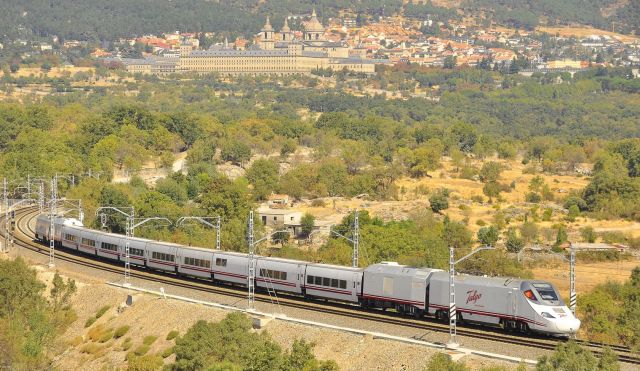Ten Spanish companies are joining forces to build high-speed hydrogen trains as part of the Hympulso project, part of the Strategic Projects for Economic Recovery and Transformation (PERTES), according to Talgo, one of the main players in the project.

A new hydrogen and battery powertrain will be developed for a Talgo 250 train, enabling it to run on clean energy on non-electrified lines. The main partners are Talgo, Golendus, Ingeteam, Repsol, Sener and Optimus3D.
Ten Spanish companies have joined forces to design, build and install, for the first time in the world, a renewable hydrogen fuel cell propulsion system on a high-speed train. As part of the Hympulso project, the companies will develop a set of technologies that can be applied to the Talgo 250 train, making it possible to electrify the rail network with energy generated entirely from renewable sources, even on lines without overhead power lines.
Led by Talgo, Hympulso also includes Golendus, Ingeteam, Optimus3D, Repsol and Sener as partners. Universidad Pontificia Comillas and Tecnalia are collaborators, while Adif has observer status. The initiative has received a €6.5 million grant and is part of the Renewable Hydrogen Innovative Value Chain and Knowledge Stimulation Programme as part of the Recovery, Transformation and Resilience Plan.
Hympulso will be comprehensive: it will activate the entire renewable hydrogen value chain in the rail system, from production to consumption. The project will also allow the analysis of the impact of the future transition on the different railway infrastructure assets managed by Adif, such as maintenance facilities or track.
Thus, the project will result in a joint production of rail-adapted hydrogen fuelling installations – both mobile and static – and a pioneering prototype of a dual-mode hybrid passenger train with automatic gauge change, which will be able to run on both conventional and high-speed networks, using catenary power where available, or hydrogen and batteries on those corridors that are not electrified.
This integrated perspective is essential because addressing the many major technological challenges posed by the adoption of renewable hydrogen in rail transport will require the involvement of multiple stakeholders at all levels and from both the public and private sectors.
All project partners aim to develop their generic technologies and expertise in the field of renewable hydrogen together with Hympulso. Thus, Talgo’s objective will be to develop, manufacture and test dual hybrid hydrogen battery traction on a Talgo 250 train, intended for long distance operation on mixed sections: partly electrified and partly non-electrified.
Called Talgo 250, these trains have two technical end wagons (TEWs) each, which are currently used to generate electricity from diesel to power traction units on non-catenary sections. As part of the Hympulso project, one of these diesel TECs will be replaced in a Talgo 250 unit by one equipped with fuel cells and batteries to supply electricity to locomotives using 100% green and renewable hydrogen.
Who are the partners for high-speed hydrogen trains
Ingeteam will design, manufacture and test high-power reversible converters capable of charging the catenary batteries. Repsol and Golendus will be responsible for the development of two hydrogen refuelling plants. Repsol will implement a mobile plant, while Golendus’ hydrogen plant will be a static production and refuelling plant.
For the hydrogen refuelling facilities and for the rail infrastructure, Sener will carry out a comprehensive risk analysis and service operation simulation. In both cases, a logistics control platform will be developed to monitor the use of hydrogen in the network.
Finally, an SME, Optimus3D, based in Alava, will work on new, more efficient and sustainable materials based on additive manufacturing and new processes to be used in hydrogen applications.
As far as the observer companies are concerned, Adif wants to develop their expertise in defining requirements and use cases in accessing the rail infrastructure for hydrogen technology. It will develop the safety requirements associated with the infrastructure and interfaces to the vehicle and refuelling facility, as well as the design of standardised refuelling facilities and collaborate with hydrogen refuelling platform use cases.
Adif will also include the overall management of these new fuels in its wider hydrogen strategy and will contribute during on-track testing by facilitating access to the rail infrastructure.
The Hympulso project is part of the ‘Value Chain: Design, Demonstration and Validation of Hydrogen Fuelled Mobility’ call, which is part of PERTE (Strategic Projects for Economic Recovery and Transformation) for Renewable Energy, Renewable Hydrogen and Storage (ERHA). In the resolution of the call for proposals, this project received the highest score for the soundness of its technical proposal and its innovative character.
In the ERTA designation, a sector is identified as a key area for the future of the economy. In total, twelve strategic projects were approved in areas such as the development of electric and connected vehicles, renewable energy, renewable hydrogen and storage, next-generation healthcare, the agri-food sector, the new language economy, the circular economy model, the shipbuilding industry, aerospace, the digitisation of the water cycle, microchips, the social and care economy and the decarbonisation of industry.
Share on:



